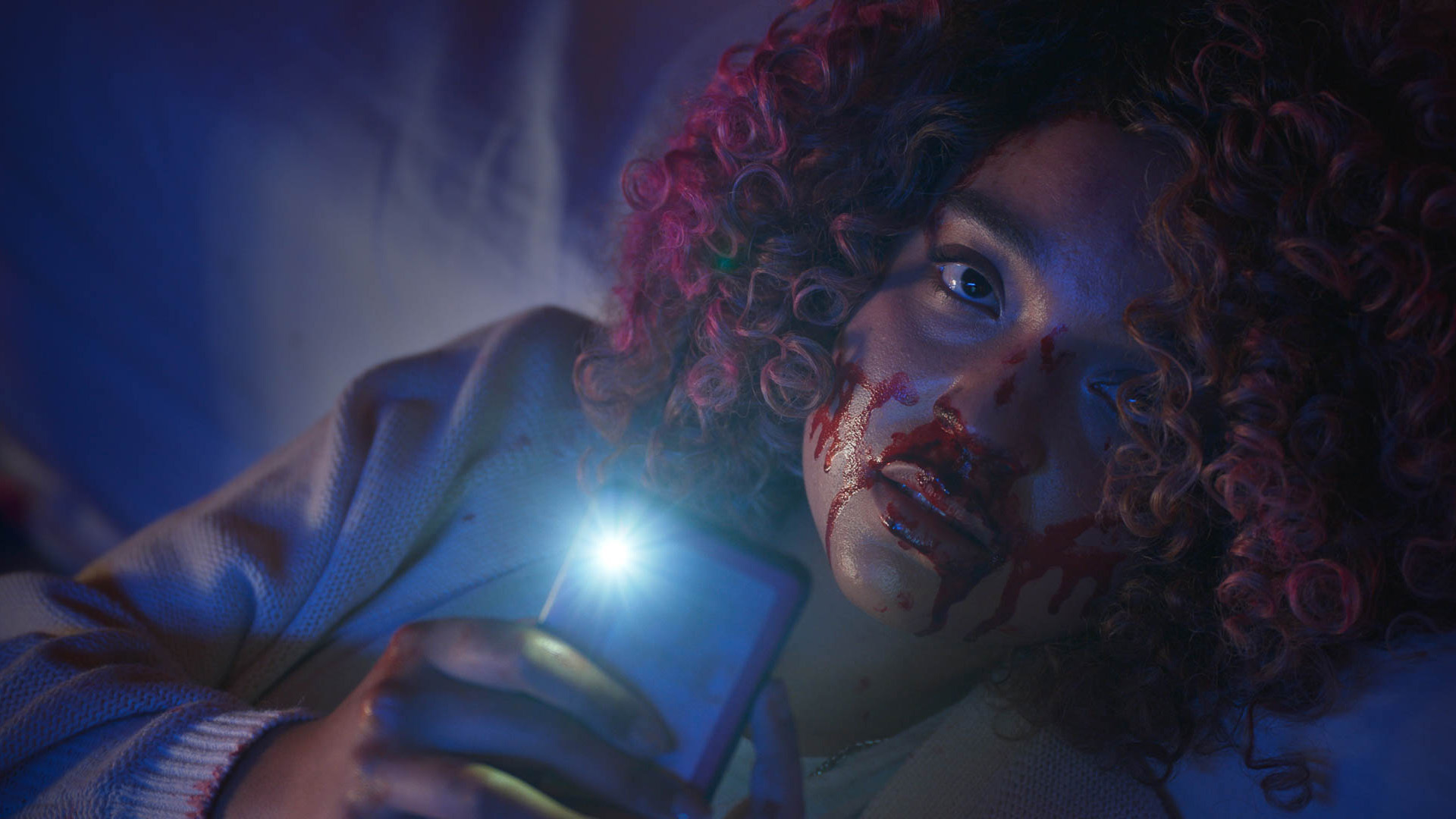Glitter Gore and Magical Madness: An Interview with Hannah Barlow

Critics Campus 2022 participant Lamya Nawar speaks to Hannah Barlow about self-awareness, self-forgiveness, and the power and perils of social media, as tackled in the pop-horror film Sissy.
Hannah Barlow and Kane Senes’s pop-infused horror flick Sissy delves into friendship reconnection gone wrong. Pre-teen best friends Emma (Barlow) and Cecilia (Aisha Dee, The Bold Type) thought they would be together for life, until a bullying incident involving their classmate Alex (Emily De Margheriti) tragically tears them apart.
Years later, Cecilia – or @SincerelyCecilia, as she is known to her 200,000 Instagram followers – has supposedly moved on with her life, making a living as a wellness influencer online. But, after a chance run-in with Emma, Cecilia agrees to attend her ex–best friend’s hens’ retreat, where she finds out that Alex, the new best friend, will be in attendance. Too soon, old traumas start to resurface, but this time with more dire consequences.
Sissy draws inspiration from Barlow’s personal experiences of bullying and its effects on her mental health. “I think that, as women, we all go through a stage … where we have these really intense friendships that inevitably fall apart,” she says. “It’s kind of like our first heartbreak that we ever experience.” She continues: “I had a couple of friendships that fell apart and fell prey to bullying, and my response to being bullied as a 10-year-old was not great. I reacted in a way that made it worse, and that had long-term effects on my mental health growing up. I became a perfectionist and started projecting a version of myself that wasn’t quite authentic.”
Psychological projection is explored in Sissy through Cecilia’s trajectory as an influencer. For her, cultivating a (safe) space where she can act as if she is truly in control of her mental health is a way of hoping that she can practise it in her real life – a form of positive gaslighting, if you will.
This is a surprisingly realistic depiction of our relationship with social media. Despite the ubiquitous presence of these apps in our lives, their existence has been awkwardly explored in art. While some films prefer to pretend they do not exist, the horror and thriller genres have taken to exemplifying their danger as inherently menacing creations. Take Ingrid Goes West (2017), in which the classic stalker archetype conducts surveillance via Instagram. But even when filmmakers are sympathetic to their social-media-addicted leads, there is still the tired suggestion that self-transcendence awaits if we live manifestly offline. Luckily, Sissy does not allude to this delusion in any form. The binary between our online and real-life selves does not exist. Rather, they shape one another.

Sissy
By taking this approach, Barlow paints a much more sympathetic portrait of Cecilia. Social media is a self-affirming tool for her. She trawls her followers’ comments for comfort, not unlike how Alex fishes for reassurance that she has done nothing wrong to Cecilia. “Cecilia as a character is a vehicle for that kind of dialogue between self-compassion and self-criticism,” explains Barlow. “Emma, Cecilia and Alex, to me, represent that toxic triangle of female friendship.”
The trio’s friendship dynamic generates self-conscious questions about our psyches. Is it possible to hold ourselves accountable without self-hate? How can we turn self-hate into self-compassion? Raising these issues is already subversive for a genre that has been repeatedly criticised for sensationalising mental-health conditions.
But Sissy does not shy away from depicting truly violent outcomes. The special effects ensure that deaths are creatively gruesome but never gratuitous. Yet compassion and empathy are interwoven within the violence, as dreamy visual effects transpire even in the most horrific moments. Towards the end of the film, the vacation house floods with thousands and thousands of stars while, inside, blood is still drying on the bathroom floor. Barlow describes this visual dissonance, championed by her editor Margi Hoy, as “glitter gore”.
“[It’s] Cecilia’s projected fantasy, her expectation of what her life was supposed to be, out into the world,” says Barlow. “As she’s becoming more unhinged, and the violence is increasing, so is her sort of magical madness.”
If we consider horror films to be cautionary tales, Sissy’s message is devastating. The film shows that avoiding confrontation with the darkest part of ourselves can simply highlight our flaws, like a magnifying glass concentrating sunlight on tinder to start a fire. The horror is what happens when we don’t let ourselves heal.
“[Senes] and I want to make movies that are self-deprecating … so we’re examining, investigating and putting out into the world parts of ourselves that we don’t like,” says Barlow. “We also want to make stories that give people permission to forgive themselves.”